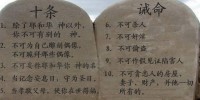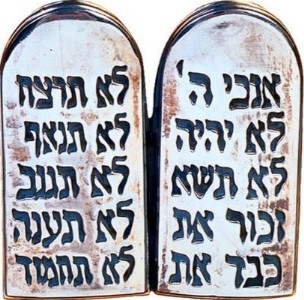 出埃及记第十一课:十诫(一):出埃及记20章
出埃及记第十一课:十诫(一):出埃及记20章
摩西是圣经里的重要人物之一;“十诫”是中外历史中最有名的律法之一。也许以下的分析会让您认识摩西更深而明白“十诫”的意思和重要性。
一。出埃及记20:1-17:《十条诫命》:此章节是旧约里最重要的部分之一。十诫是旧约律法的基础,是神对以色列人之要求的标准,是有罪之人接触无罪之神的途径。十条诫命的每一条是其他在旧约里之法律的根基。每一条表示神要以色列人明白的原则。头四个诫命是人对神所当负的责任;第五条至第十条包括人对人当负的责任。
二。出埃及记20:1-2:
“神吩咐这一切的话”:参看出埃及记31:18: (1)神发言说话;摩西听得出声音。 (2)神写字(刻字)在石板上。
“话”:十条诫命的不同名称是:“两块法版”(出埃及记31:18);“十条诫” (出埃及记34:28;申命记4:13,10:4);十条。(新译本翻为“十条诫命”。)希伯来原文意为“十字”。今天的简写就是“十诫”。
“我是耶和华你的神,曾将你从埃及地为奴之家领出来”:以此句话,神宣布以色列人属于他。神说他有拥有权向以色列人要求以下的诫命。神以“曾将你从埃及地为奴之家领出来”为理由要求他们遵守这些诫命。神是“王”;以色列人是他的臣民,他们自愿的臣服神。
“我是耶和华”的原文就是本套教材的第二课所介绍的希腊字。(请复习出埃及记3:14。)十诫的意义来自这个事实,就是十诫是那位“自有永有”的神颁布的。
“你”:请注意:“你”,而不是你们;原文是单数的,不是复数的。每一个人要个别的接受并遵守此约。这样看来,没有任何人有权力为所欲为。
 三。出埃及记20:3:第一条诫命:“除了我以外,你不可有别的神”。
三。出埃及记20:3:第一条诫命:“除了我以外,你不可有别的神”。
肯定:“一神论”。
否认和禁止:“多神论”,“不可知论”,“精灵论”,“唯物论”,“人本主义”,“自然神论”等。
命令:要相信神的存在,神的权柄。人要敬畏、惧怕并顺服神。
原则:在人的生命上,神要居首位;人要把神高举在他的生命当中。
今天:你如何把此诫命用在自己日常生活上?
四。出埃及记20:4-6:第二条诫命:“不可为自己雕刻偶象…”。
肯定:神是独一无二的真神;没有任何“物”能够代表神。任何雕刻或画像只能限制神(只能限制人对神的观念)。
否认和禁止:为了尊荣或敬拜的缘故而制造偶像(包括真神假神在内)。不可以敬拜假神。(我认为此诫命不禁止跟敬拜无关的美术雕刻和画像。)
命令:要敬拜真神;只要敬拜真神;要以正确的方法敬拜真神。
原则:神不让世人把他应该得到的尊荣拿去给别的“神”(神明、东西、人物等)。
“我耶和华你的神,是忌邪的神”:“神专心建立他至高无上的权力。神不容忍任何偶像,因为偶像让人分裂他对神的忠诚” (Thompson)。意思是神不容忍属于他的人去敬拜偶像,如同你我不容忍配偶把他(她)的爱分给别人。
今天:你如何把此诫命用在自己日常生活上?
五。出埃及记20:7:第三条诫命:“不可妄称耶和华你神的名”。
肯定:神的名字是神圣的。(参看利未记24:15-16。)
否认和禁止:不可以提神的名字发誓证明谎言为真实。不可以假借神的名来支持和拥护一个谎话或誓言。
命令:要尊重和敬畏神。连他的名字都是神圣的。犹太人发誓时,话必须是真实的;请参看申命记6:13。
原则:要敬畏神、敬畏神的权威、神的权柄和神的话(《圣经》)。
今天:你如何把此诫命用在自己日常生活上?
六。出埃及记20:8-11:第四条诫命:“当记念安息日,守为圣日”。
肯定:神把一些日子定为“圣日”。神命令犹太人守星期六为圣日。
否认和禁止:禁止犹太人在安息日工作。
命令:犹太人要遵守神的安息日(参看出埃及记31:12-17)。
原则:(1)神对人的时间有一份权力;神有权柄管理人,么样使用他的时间。(2)人需要休息。(3)人需要纪念某些事。(4)人们有责任安排时间敬拜神。
今天:你如何把此诫命用在自己日常生活上?
读者:欢迎您把这篇短文下载,复印,用在您的《圣经》班里。
Bible Study Questions: Exodus Lesson Eleven
Exodus 20: The Ten Commandments /01
1. Ex. 20:1-17: “The Ten Commandments”: This chapter is one of the most important in the Old Testament. The Ten Commandments are the foundation of the laws in the Old Testament, they are the standard of God’s requirements for the Israelites and are the route by which sinful men can make contact with a sinless God. Each of the Ten Commandments is the foundation upon which other Old Testament laws are built. Each commandment expresses principles that God wanted the Israelites to understand. The first four commands are man’s responsibility to God; numbers five through ten are man’s responsibility to man.
2. Ex. 20:1-2: “God spoke all these words”: See Ex. 31:18: (1) God voice was audible. (2) God wrote (inscribed) words on stone tablets. “Words”: Other names for the Ten Commandments: “tablets of the Testimony” (Ex. 31:18); Ten Commands” (Ex. 34:28; Deut. 4:13, 10:4). [The New Chinese Translation is a bit different from the Union Version.] The original Hebrew is the “Ten Words.” “I am the LORD your God, who brought you out of Egypt, out of the land of slavery”: With this sentence, God claims the Israelites as his own. God says that he has authority of possession to make the commands that follow. The statement, “who brought you out of Egypt, out of the land of slavery,” is reason God can require them to obey these commands. God is the “king”; the Israelites are his subjects and they willingly obey God. In the original language, “I am the LORD your God,” is the Hebrew term introduced in Lesson Two of this series. (Please review Ex. 3:14.) The significance of the Ten Commandments comes from this fact, i.e., because the Ten Commandments are promulgated by the God who is the “I AM.” “You”: Note that “you” is singular not plural. Each person was to accept these commands as an individual and then obey them. In this way, no one had the right to go his own way and do whatever he wanted.
3. Ex. 20:3: The First Commandment: “You shall have no other gods before me.” Affirms: Monotheism. Condemns and prohibits: Polytheism, agnosticism, animism, materialism, humanism, naturalism, etc. Commands: Belief in God’s existence and power; man should fear and obey God. Principle: God must be given first place in man’s life; man must give God first place.
4. Ex. 20:4-6: The Second “Commandment: “You shall not make for yourself an idol…” Affirms: God is the one and only God; no “item” can represent God. Any carved image or painting only limits God (such can only limit man’s concept of God). Condemns and prohibits: The carving or painting of any idol for the purpose of veneration or worship (includes both the real God and false gods). Worship of false gods is not allowed. (I believe this command does not prohibit sculpted and painted artful expression when worship is neither involved or intended.) Commands: Worship of the true God; worship only the true God; worship the true God in a correct way. Principle: God does not allow man to give to any other “god” the veneration that is due him (the true God). ”I, the LORD your God, am a jealous God”: “God is actively engaged in the establishment of his own sovereignty; [God] will not tolerate idolatry in any form since this amounts to divided allegiance” [Thompson]. This means that God does not allow those who belong to him to worship idols, just like you and I do not tolerate our spouse giving his/her love to another person.
5. Ex. 20:7: The Third Commandment: “You shall not misuse the name of the LORD your God”: Affirms: God’s name is holy. (See Leviticus 24:15-16.) Condemns and prohibits: Cannot use God’s name to swear as true something that is false. Cannot misuse God’s name to support a lie or oath. Commands: Respect and reverence God’s name. Even his name is holy. Whenever Israelites swore, their words should be truthful; see Deut. 6:13. Principle: Respect God, his authority, his power and his Word (the Bible).
6. Ex. 20:8-11: The Fourth Commandment: “Remember the Sabbath day by keeping it holy…” Affirms: God set aside some days as “holy days.” God commanded the Jews to observe Saturday as a holy day. Condemns and prohibits: Jews were to do no work on the Sabbath. Commands: Jews are to observe God’s Sabbaths (see Exodus 31:12-17). Principles: (1) God has a right to man’s time; God has authority to control man’s use of his time. (2) Man needs to rest. (3) Man needs to remember some events. (4) Man has the responsibility to appropriate time to worship God.
本课之部分资料来自Thomas Warren博士。他是我研究所的伦理教授。Some of the material in this lesson is based on class notes I took when studying Ethics in graduate school under Dr. Thomas Warren. 我记得Warren博士时常提到The Master Bible。Dr. Warren made reference to The Master Bible which he seemed to like very much.
圣经问答
出埃及记第十一课:十诫(一):出埃及记20章
Bible Study Questions: Exodus Lesson Eleven
Exodus 20: The Ten Commandments /01
作者:谢德华 ©By Edward Short
本文所问的问题使用汉子圣经。
欢迎您把此文下载用在圣经班或私人学习。
A series of Bible lessons, written in Chinese
and based largely on the text of the Chinese Bible.
You may download and print copies of this lesson
for use in your Bible class.
World Christian Broadcasting
Franklin, TN 37067 USA
